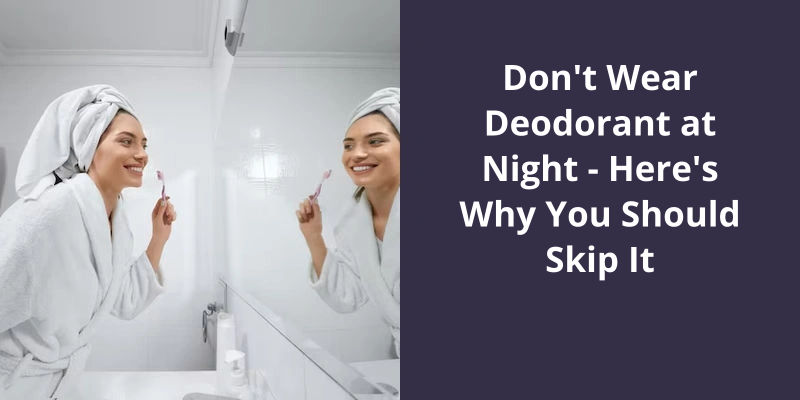Not wearing deodorant at night can be beneficial for your skin health. The main reason behind this is that many deodorants contain harsh chemicals that could potentially irritate your skin, especially when left on for extended periods. Your body also needs time to breathe and regenerate, and skipping deodorant at night can allow your skin to do so. Moreover, your sweat glands are less active at night, so you might not need deodorant as much as you think. Lastly, applying deodorant right after shaving before going to bed could cause even more irritation, as your skin is already sensitive from the shaving process. So, it’s generally a good idea to give your armpits a break during the night.

Is It Better to Put Deodorant on at Night or Day?
The debate over when to apply deodorant has raged on for years. Some people swear by applying it in the morning, while others prefer to do so at night. The truth is, both methods have their pros and cons.
If you apply antiperspirant deodorant at night, you may be giving it time to work more effectively. Our body temperature drops at night, and this means we sweat less. As a result, our sweat ducts are able to absorb the aluminum-based active ingredient in antiperspirant better. This helps to block sweat pores and reduce the amount of odor-causing bacteria on our skin.
However, if you prefer to apply deodorant in the morning, that’s also okay. The important thing is to use it consistently. Many people feel more refreshed and energized after a morning shower, and applying deodorant can be part of their daily routine.
One thing to keep in mind is that if you’ve sensitive skin, applying deodorant too often can cause irritation.
Another consideration is the type of deodorant you use. Some deodorants contain harsh chemicals that can be harmful to your skin, while others contain natural ingredients like essential oils that are gentler on your skin. It’s important to read the labels and choose a product that’s safe and effective for you.
Different Types of Deodorants and Their Effectiveness
- Antiperspirants – reduces sweating and controls body odor by blocking sweat ducts with aluminum salts
- Natural deodorants – uses natural ingredients like essential oils, coconut oil, and baking soda to neutralize odor
- Deodorant sprays – works by masking odor with fragrance
- Deodorant crystal – uses mineral salts that create a barrier against odor
- Clinical strength deodorants – contains higher levels of aluminum salts for stronger odor and sweat protection
- Scented deodorants – contains fragrance to mask odor
According to Dr. (name), using deodorant around the clock may not be necessary and could potentially cause irritation to the skin. While some may believe it’s healthier to wear deodorant 24/7, it’s important to consider the potential risks of overuse.
Is It Healthy to Wear Deodorant 24 7?
Perspiration is a natural process that helps regulate body temperature by releasing moisture from sweat glands. However, the sweat, especially that produced by apocrine glands in the armpits, can create an unpleasant odor when it comes into contact with bacteria on the skin. Deodorants, often containing antibacterial agents, mask this odor and prevent the growth of bacteria, resulting in a more pleasant smell.
However, wearing deodorant around the clock can potentially irritate the skin, especially in sensitive areas like the underarms. This irritation can lead to redness, itching, and even rashes. Some deodorants also contain chemicals like aluminum compounds that can clog pores and cause inflammation.
While there’s no evidence to suggest that wearing deodorant 24/7 is harmful in the long term, it’s important to use it in moderation and take breaks from it to allow the skin to breathe. It’s also important to choose deodorants made with natural ingredients that are less likely to cause irritation.
If you notice any signs of irritation or discomfort from using deodorant, it’s best to switch to a different brand or consider using a natural alternative like baking soda or coconut oil. It’s always a good idea to consult with a dermatologist if you’ve persistent skin issues or concerns.
However, it’s important to be aware of potential irritation and choose natural alternatives when possible. As with any personal care product, it’s important to listen to your body and make adjustments based on your individual needs.
While deodorant may not have a direct impact on sleep quality, there are several other factors to consider when trying to get a good night’s rest. From developing a consistent sleep schedule to creating a calming bedtime routine, there are plenty of strategies you can use to improve your sleep hygiene. In the next section, we’ll explore some science-backed tips for getting better sleep.
Does Deodorant Help You Sleep?
Furthermore, the scent of certain deodorants may also have a calming effect on the body, which could potentially aid in falling asleep. Some deodorants and antiperspirants contain essential oils like lavender, which has been shown to have a sedative effect on the body. However, the amount of these oils in deodorant may be too small to have a significant impact on sleep.
It’s also important to note that wearing deodorant at night may not be the best idea for individuals with sensitive skin.
Source: Is it “the norm” to apply deodorant before going to bed at …
While some people swear by their deodorant as a daily essential, dermatology experts say that it’s not necessarily required for everyone. In fact, the decision to use deodorant daily is often more a matter of personal and cultural preference than a medical necessity. So if you’re wondering if it’s okay to skip deodorant some days, read on to find out more.
Is It OK to Not Use Deodorant Everyday?
Firstly, it’s important to acknowledge that everyones body odor is different, and what works for one person may not work for another. To some extent, body odor is determined by genetics, diet, and even the clothes we wear. Therefore, whether you need to use deodorant every day may depend on your unique circumstances.
Likewise, if you prefer a natural or minimalist lifestyle, you may choose to forego deodorant in favor of other odor-control methods such as baking soda or witch hazel.
Factors such as genetics, lifestyle, and personal preference all come into play. Ultimately, the most important thing is to find a hygiene routine that works for you and keeps you feeling fresh and comfortable.
The Benefits and Drawbacks of Using Deodorant on a Daily Basis
Deodorant is a personal care product used to mask or eliminate body odor. Using deodorant on a daily basis has both benefits and drawbacks. On the one hand, deodorant helps to keep underarms fresh and smelling good, and may boost personal confidence. On the other hand, some deodorants contain harmful chemicals, such as aluminum, which can irritate the skin or cause health issues, like breast cancer. In addition, overuse of deodorant can also create a dependence on the product and hinder the natural function of sweating.
To ensure that your deodorant is working effectively, it’s important to know the right time to apply it. However, it may come as a surprise that the best time to apply deodorant isn’t immediately after you get out of the shower. In fact, waiting a few minutes is crucial to ensure that your deodorant is applied to completely dry skin. So, how long should you wait after a shower to put on deodorant? Let’s explore further.
How Long Should You Wait After a Shower to Put on Deodorant?
It’s suggested to wait at least five minutes after toweling off to apply the deodorant. This allows for any excess moisture to evaporate, ensuring that the deodorant sticks to dry skin. Applying deodorant to damp skin can cause it to rub off quickly, leaving you without protection against sweat and odor.
Additionally, waiting a few minutes can allow time for the skins natural oils to replenish. Deodorants can often be abrasive, causing irritation and dryness. Giving your skin a break and allowing time for it to naturally moisturize can prevent any discomfort or irritation that may arise from applying deodorant too soon.
If you’re in a hurry and don’t have time to wait, you can speed up the drying process by using a hairdryer on the cool setting. Simply use the dryer to blow air onto your underarms until they’re completely dry. This is a great hack for those who’re always in a rush but still want to ensure theyre smelling fresh all day long.
It’s also important to note that excessive use of deodorant can be harmful to your skin. It’s important to follow the directions on the deodorant packaging and use only the recommended amount.
Finally, for those with sensitive skin, natural deodorants can often be a better option. Made with ingredients such as baking soda and coconut oil, these deodorants are gentler on the skin and can be just as effective as traditional deodorants. Regardless of the type of deodorant you choose, waiting until your skin is dry after a shower is essential for ensuring maximum effectiveness and optimal skin health.
The Difference Between Antiperspirant and Deodorant and Their Effects on the Body
- Antiperspirant is designed to reduce perspiration and sweat production.
- Deodorant is designed to mask or eliminate odor-causing bacteria.
- Antiperspirant contains aluminum salts that block sweat ducts, while deodorant typically contains antimicrobial agents like alcohol or triclosan.
- Antiperspirant can cause skin irritation, while deodorant is typically gentler on the skin.
- Both antiperspirant and deodorant can have potential health concerns due to their ingredients, so it’s important to choose a product that works for you and your body’s needs.
Conclusion
The primary reason for this is that after the sun sets, our body perspires less, so the need for deodorizing is much less compared to the daytime. While occasional usage isn’t harmful, it’s advisable to limit it to daytime when it’s most needed. Therefore, it’s vital to follow the expert's advice and adopt healthy personal hygiene practices to avoid any unnecessary skin issues.





